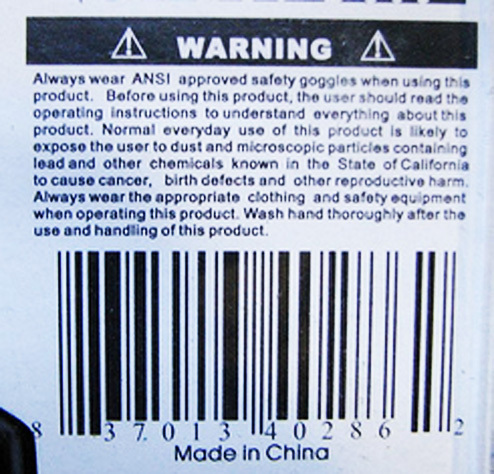Do Warning Labels On Flashlights Really Mean Anything?
Reader Bill wrote to us wondering about some cheap flashlights he bought from Amazon. Their warning label says to “Always wear ANSI approved safety goggles when using this product…Normal everyday use of this product is likely to expose the user to dust and microscopic particles containing lead and other chemicals known in the State of California to cause cancer, birth defects and other reproductive harm.” Should Bill be worried about the cancer risk and reproductive harm of his flashlights?
In its current state, Proposition 65 is a catch-all for huge list of substances which if used on any product in California, must comply with the required warning labels like the kind we see below on Bill’s flashlight. Because of the way that Proposition 65 is written, the warning label must be used, even if only a minute amount of lead is present.

According to Dr. Subhuti Dharmananda,
The warning labels required by Proposition 65 do not present information about the safety or the risk of the products; the warning about lead does not specify the actual amount of lead that is present or whether any particular amount is harmful. The requirement for a warning label is triggered when the amount of a regulated substance in a product exceeds a certain regulatory level, which is very low in the case of lead. According to the way Proposition 65 is worded and with the limited data about effects of exposure to lead, the labeling must be done if the total daily lead intake exceeds just 0.5 micrograms (µg).
In fact, many contend that Proposition 65 is really just a nuisance which does little more than provide ammunition for private citizens to collect damages from companies that they don’t like. Wikipedia says,
Labeling requirements conceded the reality that listing and classifying substances did not help the consumer if the contents of a purchase were unknown. At the same time, there were no other labeling requirements to support the proposition. Industry critics and corporate defense lawyers charge that Proposition 65 is “a clever and irritating mechanism used by litigious NGOs and others to publicly spank politically incorrect opponents ranging from the American gun industry to seafood retailers, etc.” [4]
In addition, because the law allows private citizens to sue and collect damages from any business violating the law, there have been cases of lawyers and law firms using Proposition 65 to force monetary settlements out of California businesses.[5] The Attorney General’s office has cited several instances of settlements where plaintiff attorneys received significant awards without providing for environmental benefit to the people of California, resulting in the requirement of the Attorney General’s approval of pre-trial Proposition 65 settlements.[6]
Given the proposition’s overly broad scope, even companies who aren’t using hazardous materials, simply go ahead and post the warnings, perhaps, if only to say “don’t sue us!” Wikipedia says,
Nearly all businesses in the state post similar notices on their premises, even when they are unaware of any listed chemicals being present. Warning signs are always posted at gas stations, hardware suppliers,[2] grocery stores, drug stores, and medical facilities.[3] Most government agencies,[4] parking garages, apartment complexes,[5] retail stores,[6] banks, and restaurants[7] also post warning signs because of the possibility of hazardous chemicals being present in everyday items, such as a car or a computer, or because tobacco smoke from a passerby might drift in through an open window. Some large businesses, such as utility companies, mail a Prop 65 notice to all customers each year to warn them of dangerous substances like natural gas[8] or the sand used in sandblasting.[9]
Warning labels that warn against any infinitesimal risk are essentially useless. The outbreak of warning labels spawned by Proposition 65 is so widespread that consumers are being conditioned to ignore them. Even if some of these labels are trying to warn us against a legitimate risk, we are likely to ignore them since these labels “cry wolf” more often than they protect us.
California Proposition 65 (1986) [Wiki]
Proposition 65 [OEHHA]
Frequently Asked Questions About Proposition 65 Lead Warning Labels [ITMOnline]
Want more consumer news? Visit our parent organization, Consumer Reports, for the latest on scams, recalls, and other consumer issues.

